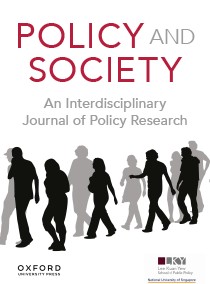“I do not consent”: political legitimacy, misinformation, and the compliance challenge in Australia’s Covid-19 policy response
IF 6.1
1区 社会学
Q1 POLITICAL SCIENCE
引用次数: 0
Abstract
This paper examines the relationship between policy compliance, the emergence of alternate epistemes and authorities in online spaces, and the decline of trust and legitimacy in democratic institutions. Drawing on insights from public policy, regulation theory, and political theory, the paper critically engages with scholarship on “policy-takers” to illuminate the tensions of compliance and legitimacy in liberal states. It proposes a compliance–legitimacy matrix that identifies the features of policy compliance—including consent, legitimacy, expertise, and trust—and their relationship to the disaggregation of policy knowledge. The article applies this framework to a case study of social media posts that respond to policy information during the management of the Covid-19 pandemic in Australia. Through analysis of these posts, the study reveals the distrust in “the science” and experts advocated by government and the calls from skeptic groups for noncompliance with public health measures. The paper argues that public policy faces an epistemic crisis of public confidence, with significant downstream consequences for compliance with public policy initiatives that has been brought on both by the failures of states to cultivate trust in science and the government. The compliance–legitimacy matrix offers a useful tool for policymakers to anticipate and address objections from policy-takers and to preempt and diffuse their fears.“我不同意”:澳大利亚应对新冠肺炎政策中的政治合法性、错误信息和合规挑战
本文考察了政策遵从、网络空间中替代认知和权威的出现以及民主制度中信任和合法性的下降之间的关系。借鉴公共政策、监管理论和政治理论的见解,本文批判性地与“政策制定者”的学术研究相结合,阐明了自由国家的合规和合法性之间的紧张关系。它提出了一个合规-合法性矩阵,该矩阵确定了政策合规的特征——包括同意、合法性、专业知识和信任——以及它们与政策知识分解的关系。本文将这一框架应用于对社交媒体帖子的案例研究,这些帖子在澳大利亚Covid-19大流行管理期间响应了政策信息。通过对这些帖子的分析,该研究揭示了人们对政府倡导的“科学”和专家的不信任,以及怀疑团体对不遵守公共卫生措施的呼吁。这篇论文认为,公共政策面临着公众信心的认知危机,由于国家未能培养对科学和政府的信任,对公共政策倡议的遵从产生了重大的下游后果。合规-合法性矩阵为政策制定者提供了一个有用的工具,可以预测和解决政策制定者的反对意见,并先发制人,消除他们的恐惧。
本文章由计算机程序翻译,如有差异,请以英文原文为准。
求助全文
约1分钟内获得全文
求助全文
来源期刊

Policy and Society
Multiple-
CiteScore
18.00
自引率
6.50%
发文量
43
审稿时长
30 weeks
期刊介绍:
Policy and Society is a prominent international open-access journal publishing peer-reviewed research on critical issues in policy theory and practice across local, national, and international levels. The journal seeks to comprehend the origin, functioning, and implications of policies within broader political, social, and economic contexts. It publishes themed issues regularly and, starting in 2023, will also feature non-themed individual submissions.
 求助内容:
求助内容: 应助结果提醒方式:
应助结果提醒方式:


